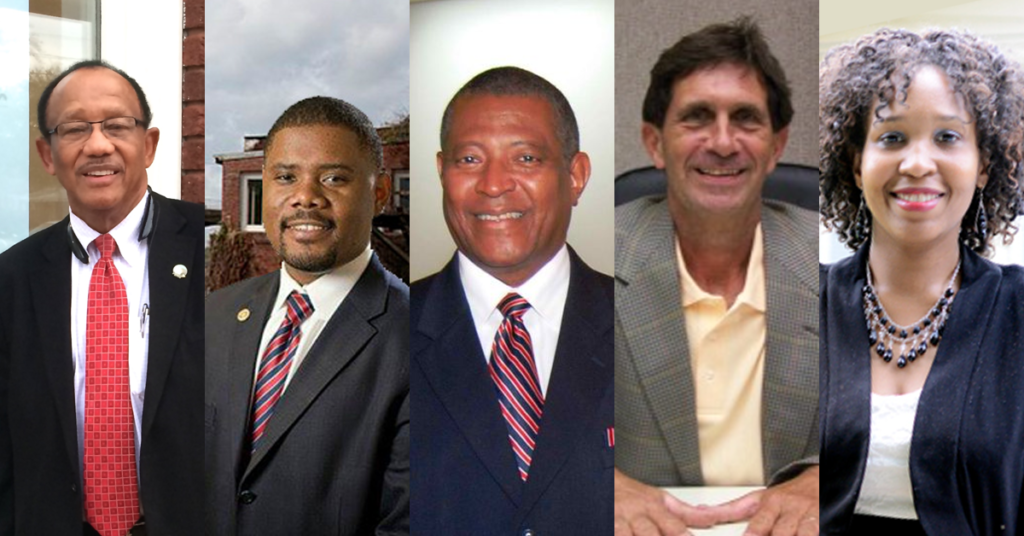Selma’s 5 mayoral candidates participate in weekend political forum

It’s a crowded field of candidates vying for the position of Selma mayor. Five candidates are in the running — Ward 3 Selma City Councilman Greg Bjelke, incumbent Mayor George Evans, Baptist minister Jerria Martin, State Rep. Darrio Melton and former Selma mayor James Perkins Jr. — and Selma residents had the opportunity to hear from each of them at a political forum Sunday afternoon at Selma High School. There, all five candidates shared their platforms and took turns answering questions for 90 minutes. “We’ve got a lot of work to do,” said incumbent Mayor George Evans. “We need some infrastructure changes and street paving, and stuff like that doesn’t come overnight. And so, it’s just going to take a bonafide effort from the citizens of Selma along with city government, education-wise along with industry to build our city. And it can be done.” First elected in 2008, Evans defeated then-incumbent James Perkins Jr., who is making another go for the post. Since his time in office, Perkins became the pastor of a Selma church. “This is just an opportunity for me to share experience, knowledge about what’s going on in our community to help build Selma,” Perkins says. Another mayoral hopeful at the forum was State Rep. Darrio Melton. “Our city is crumbling at its foundation,” Melton told the crowd. “I have experience, I have relationships both in the federal and state level that I think I can use in regards to building our city and moving our city into the 21st century.” Despite her lack of political experience, Jerria Martin, 28, brought youthful energy to the forum. “Even our motto is, ‘From Civil War to Civil Rights and Beyond,’” Martin said. “But my question is, when are we going to get to the beyond? I think it’s time for this younger generation to rise up and be that beyond, and lead us to that beyond.” Selma City Councilman Greg Bjelke said he wants to do more for the city. “I felt as if I was sitting on my hands, and show up to the meetings and yay and nay and go to ribbon cuttings, and that’s all very nice and all, but I wanted to more,” Bjelke, who’s been sitting on the city council to 2011, said. Sponsored by “One Selma,” the event was moderated by WAKA news anchor Darryl Hood and was followed by a city council forum as voters in the Black Belt’s largest city prepare to cast their ballots in the state’s municipal elections Aug. 23.
Report: Sally Bradshaw says she may vote for Hillary Clinton

A prominent Jeb Bush aide has said she might vote for Hillary Clinton come November. Sally Bradshaw told CNN on Monday that she has left the Republican Party to become an independent. Bradshaw, a close adviser to Bush, also said if the presidential race in Florida is close, she will vote for Clinton come Election Day. “This election cycle is a test,” she told CNN. “As much as I don’t want another four years of (President Barack) Obama‘s policies, I can’t look my children in the eye and tell them I voted for Donald Trump. I can’t tell them to love their neighbor and treat others the way they wanted to be treated, and then vote for Donald Trump. I won’t do it.” Bradshaw is a longtime Bush family supporter, working first on George H.W. Bush’s 1988 presidential campaign. She remained close with the family, and has served Jeb Bush in several capacities over the years, including a significant role in his 2016 presidential bid. Her comments come as Trump criticizes a family of a Muslim soldier killed in action in Iraq in 2004. Bradshaw told CNN that Trump’s remarks were despicable. Bradshaw told CNN she had been considering switching parties for a while, but Trump’s recent comments solidified her decision. She said she had worked hard to make the party “a place where all would feel welcome,” but Trump has taken the GOP in a different direction. While she told CNN she wasn’t sure who she would vote for in November, she said if the race in Florida is close she “will vote for Hillary Clinton.” She said she disagrees with her on several issues, but the country is at a crossroads and “this is a time when country has to take priority over political parties.”
Hoover mayor draws two challengers for Aug. 23 municipal election

Hoover mayor Gary Ivey has drawn two challengers in the Birmingham suburb’s Aug. 23 municipal elections. Former Hoover City Fire Marshal Frank Brocato and Hoover City Schools Foundation President Steve McClinton will appear on the ballot, in what has become a highly contested race. Here is a quick review of each candidate and their proposed plans for the city, in alphabetical order: Frank Brocato Brocato, 63, served 42 years in the city’s fire department before retiring in 2015. With his background in public safety, Brocato has said he will make police and fire one of the top priorities for his administration, should he be elected. “My commitment to public safety will never be compromised,” Brocato told The Hoover Sun. “I think our city was built on providing a great public safety program.” Another issue for Brocato is increasing school funding. “Our school system is running a deficit every year and having to draw from their reserves,” said Brocato. “My fear is that if the school system begins to suffer, I believe it has just a domino effect,” causing property values and businesses to suffer. “I don’t think this city wants to see that happen.” Where to read more: http://frankbrocatoformayor.com https://www.facebook.com/frankbrocatoformayor Gary Ivey (I) Ivey, the owner of Hoover’s Crest Cadillac and the former city council president, has been mayor since his appointment to serve out the remainder of former mayor Tony Petelos‘s term in 2011. He was re-elected without a challenger in 2012. Ivey is seen as the establishment candidate in the race, and in a year where a plurality of Alabamians voted for anti-establishment presidential candidate Donald Trump, many incumbents are rightly taking extra precautions. Ivey began the campaign with more than $140,000 on hand, and is spending the money with alacrity. In the last several years he has bristled at increasing funding to the Hoover public schools, which has remained at around $2 million annually since a precipitous drop from around $8 million in 2008 — likely the main issue that brought his challengers. Where to read more: http://mayorivey.com https://www.facebook.com/MayorGaryIvey Steve McClinton On temporary leave from his volunteer position as president of the Hoover City Schools Foundation, McClinton, 47, a financial planner and father to three children in Hoover City Schools, has made no qualms about framing his entire campaign around the issue of school funding, which he believes Ivey must own. “The the schools go, so goes our city,” he proclaims in a video recently posted on his Facebook page. A late entry into the race, McClinton has a lot of ground to make up against the other two men, who have been campaigning since this spring, but he isn’t concerned. “Families, companies, and industries move to Hoover because they know it is an excellent place to raise a family. Once our schools start declining, so will our city, and I don’t believe the current administration is doing nearly enough to support Hoover City Schools.” Where to read more: www.OneHoover.com www.facebook.com/McClinton4Mayor Where to see them all speak The three mayoral candidates will meet for two forums before election day. The first event will be held Aug. 9 at 7 p.m. at Shades Crest Baptist Church, while the second is on Tuesday, Aug. 16 at 6 p.m.at the Wynfrey Hotel in the Riverchase Galleria.
Alabama is home to some of America’s worst drivers, study says

Cut off on your way to the office this morning? Saw someone get pulled for speeding over the weekend? As you shake your head and fists at other Alabama drivers in disapproval, know you’re not alone. A new study has revealed Alabama is home to some of America’s worst drivers. Recently, New York City financial technology company SmartAsset identified the states with the worst drivers, and Alabama took the sixth spot. Turns out, relatively few people are insured in Alabama. The state ranks seventh-worst in that category with just 80.40 percent insured. And, Alabama had the 12th-highest number of deaths per thousand drivers. There was one bright spot for Alabama, however — the state has the fourth-best score with only 1.42 DUI arrests per thousand drivers. That statistic does not tell the whole story, though, as 33 percent of deaths in Alabama resulted from a driver being over the legal alcohol limit. Here’s how Alabama ranks by the numbers: Percentage of driver’s insured: 80.4 percent DUI arrests per 1,000 drivers: 1.43 Vehicular related deaths per 1,000 drivers: 0.2 Google Trend “driving tickets:” 67.88 Index: 55.57 Check out the country’s top 10 states with the worst drivers below: In order to find out which state had the worst drivers, SmartAsset collected data across four metrics, then indexed each factor for every state giving equal weighting, and then finding the average score per state to create the final index. Percentage insured: data is taken from the Insurance Research Council. DUI per thousand drivers: number of drivers is taken from the Federal Highway Administration. Number of DUIs is taken from the State Justice Department. Deaths per thousand drivers: data is taken from the Fatality Analysis Reporting System, which is part of the National Highway Traffic Safety Administration. Google trends on driving tickets: the average of the scores each state received in Google Trends for the eight phrases: speeding ticket, “speeding ticket,” speeding tickets, “speeding tickets,” traffic ticket, “traffic ticket,” traffic tickets and “traffic tickets.”
Alabama has the 10th worst school system in America

The back-to-school season is upon us and there’s bad news for students across the Yellowhammer State — according to the personal finance website, WalletHub, Alabama has the 10th worst school system in the country. In a new in-depth analysis of 2016’s States with the Best & Worst School Systems, WalletHub’s analysts compared the quality of education in the 50 states and the District of Columbia based on 17 key metrics. The data set ranges from pupil-teacher ratio to dropout rate to average SAT and ACT scores. Out of 100 possible points, Alabama schools garnered only 39.85 — a depressing total for parents relying on Alabama’s public school system. Quality of schools in Alabama (1=Best; 25=Avg.): 50th – Math test score 43rd – Reading test score 36th – Pupil-teacher ratio 18th – Dropout rate 32nd – School safety 23rd – Average SAT score 48th – Average ACT score 19th – Percentage of licensed/certified public K–12 teachers At the very bottom of the list is Louisiana with 30.33 points. At the top, Massachusetts with 73.65 points and ranks first for both School- System Quality and School System Safety. Check of the rest of the country ranks: Source: WalletHub
Stephen Stetson: Keep the faith, Alabama’s lending reform movement will win

It’s no secret that tremendous wealth can open doors, and you don’t have to look far to see the colossal power of money in the political process. Here in Alabama, the high-cost lending industries are throwing hefty sums of money around, merging affluence with influence and hoping to keep lawmakers and regulators from getting swept up in the rising sea of public outrage about how many Alabamians are caught in debt traps. A July 12 report by AL.com’s Kyle Whitmire exposed a luxurious trip for Alabama legislators to a North Carolina spa, paid for by the Alabama Lenders Association. The state Ethics Commission cleared the event, but it’s still worth noting that the lawmakers who attended the installment lenders’ conference in lush surroundings are among those who would consider legislation affecting consumer loans in our state. Alabama Arise has teamed with faith-based groups and consumer advocates across the state in a multi-year, grassroots push for reasonable protections for Alabama borrowers across a wide spectrum of loan types. Our movement’s main focus in recent years has been on reining in annual interest rates of 456 percent on payday loans in Alabama – not to mention rates of 300 percent a year on auto title loans. (Yes, you read those numbers right.) The need for change is real, and Alabama’s lending reform movement has real momentum. A payday loan reform bill sponsored by Sen. Arthur Orr, R-Decatur, nearly passed the Legislature this spring, receiving overwhelming Senate approval before dying in the House on the session’s last day. Many passionate advocates across Alabama believe 2017 could be the year for true and substantive lending reform. Payday and title lending practices don’t involve ensuring the borrower’s ability to repay the loans, and they have sent thousands of borrowers spiraling into cycles of deep debt while draining money from other areas of the state’s economy. Georgia, Arkansas, North Carolina and many other states have placed reasonable restrictions on these and other types of consumer loans, and they offer plenty of examples of profitable businesses lending money to struggling borrowers without resorting to exorbitant interest rates. There’s no reason that couldn’t happen in Alabama as well. Unfortunately, reports about a lender-funded junket to a North Carolina spa can leave everyday citizens feeling dispirited. How can an email or phone call from a constituent compete with a luxurious vacation hosted by lenders? It’s like we’re playing checkers, and they’re playing Monopoly. That kind of pessimism is debilitating to civic engagement and democracy. When ordinary folks feel like politics is a one-sided game, it’s no wonder that many would stop caring entirely. It’s a lot easier just to shrug and play Pokemon Go or talk about college football. But Alabamians shouldn’t give in to the temptation to give up. Lending reform is still on the move, and there’s real hope for change at both the national and state levels. Nationally, proposed new federal rules would require important consumer protections for payday and title borrowers. Alabamians can urge the Consumer Financial Protection Bureau to strengthen those proposals further by submitting a comment at stoppaydaypredators.org/ARLA. Every comment helps. At the state level, a new task force considering consumer lending issues in Alabama is heavy with industry representatives, but Arise and other consumer advocates on the task force will push hard for consumer-friendly changes. We’ll also oppose efforts to transform short-term payday loans into new longer-term loans that would keep borrowers in debt year-round. Such loans may not be called “payday loans,” but they could be equally usurious. The lending reform movement has broad support across Alabama and across the political spectrum, and the outcry for change is getting louder every year. The coalition against high-cost lending practices in Alabama won’t give legislators the spa treatment. We’re determined to get results through the power of the people. Our message to everyday Alabamians who support change is this: Let’s keep the faith, redouble our advocacy and remind our elected officials of the constituents they really represent. There are some things money can’t buy. ••• Stephen Stetson is a policy analyst for Arise Citizens’ Policy Project, a nonprofit, nonpartisan coalition of 150 congregations and organizations promoting public policies to improve the lives of low-income Alabamians.
Bradley Byrne: Keeping up with the U.S. Navy

“A good Navy is not a provocation to war. It is the surest guaranty of peace.” Those were the words of President Theodore Roosevelt in 1902, but they hold true today. One of the keys to peace and stability in the world is a strong naval fleet. I recently had the opportunity to travel with the U.S. Navy to observe the Rim of the Pacific (RIMPAC) naval training exercise in the Pacific Ocean. RIMPAC is the largest naval exercise in the world and involves navies from nations all around the Pacific Ocean. This year saw the largest cohort of nations participating with 25 navies taking part and six others observing. There were approximately45 surface ships, 5 submarines, 200 aircraft, and 45,000 personnel. The U.S. had the largest presence with 23 ships. Russia was not invited to this year’s exercise, but they were there nonetheless. Russia had several ships in the area “observing,” even though they were not invited to participate or observe. The participating navies did preparation on shore and at dock together and then went to sea exercising everything from humanitarian operations to submarine rescue to surface, anti-submarine and naval air warfare. The highlight of RIMPAC for me was getting to visit the USS Coronado, a Mobile-built Littoral Combat Ship (LCS), at sea. RIMPAC served as the “coming out party” of sorts for the Austal USA ship, and it is safe to say that everyone was impressed. From the Chief of Naval Operations to the Commander of the Pacific Fleet to the Commander of the USS Coronado, everyone I talked to raved about the LCS’s performance and capabilities. It really gave me such pride to know the ship was built by the hardworking people of Alabama. While on the Coronado, I actually had the opportunity to drive the ship. As someone who grew up driving boats on Mobile Bay, it was really something to drive such a large vessel. Most impressive, the LCS can get up to around 38 knots, or 42 miles per hour, and it can turn on a dime. In addition to visiting the LCS, our group also paid a visit to the USS John C. Stennis, an aircraft carrier. There is nothing quite like landing and shooting off an aircraft carrier. It is a truly unique experience. While on the ship, I was able to eat lunch with some service members from Alabama. I was excited to meet Deshundra Taite from Monroeville. Seeing people from Southwest Alabama reminded me just how small the world really is. I asked the sailors I met if they had anything I needed to know or anything I could do for them. One of them made a pretty powerful statement. She said to remind the American people how hard it is for our service members to be away from their families and loved ones for so long. It was a powerful reminder about service and sacrifice. We also had the opportunity to visit a submarine, a fuel storage facility, the Pacific Command headquarters, and the USS Arizona Pearl Harbor Memorial. All were very impressive and helped me better understand the U.S. Navy. I returned back to my home on Mobile Bay exhausted but all the more impressed by the quality of technology and individuals who make up the Navy. As a laid down that night, I was able to sleep soundly knowing the U.S. Navy patrols the world’s seas assuring our freedom and safety. • • • Bradley Byrne is a member of U.S. Congress representing Alabama’s 1st Congressional District.
Steven Kurlander: Feminist ‘Herstory’ and the rigged coronation of Hillary Clinton

The underwhelming Democratic convention in Philadelphia is over and much of the messaging done by a feminist-dominated DNC encompassed that Hillary Clinton was making “herstory” as the first woman to be nominated to run for president in the U.S. In highlighting Clinton’s achievement, an article in USA Today entitled “How it felt when America got a first woman presidential nominee” started off by stating: “Finally. That’s how millions of people felt Thursday night as a woman accepted, for the first time, a major party’s nomination for president. From the floor of the Democratic National Convention to watch parties across the nation, on TVs and laptops and smartphones, Americans beheld history — or, as some feminists would call it, herstory.” As The New York Times reported, Clinton acknowledged breaking the glass ceiling: “If there are any little girls out there who stayed up late to watch,” she said, “let me just say, I may become the first woman president, but one of you is next.” In real terms, the achievement that meant so much to leftist Democratic feminists momentarily may have touched a majority of American women too — maybe. Despite the achievement, Clinton is a weak candidate who was not supported by probably a majority of her party. The women of America care more about their pocketbooks — and the future of the American dream for their children — than about having a woman in the Oval Office. The reality is that Clinton’s breaking the glass ceiling in 2016 will not lead to her automatically capturing a vote that twice ensured the election of President Obama to the White House. President Obama brilliantly exploited the gender gap in the last presidential cycle. According to Gallup, Obama won the female vote, and a second term, by 12 points, 56 percent to 44 percent. Clinton does not share such support, even given the fact that she made “herstory.” A recent poll indicated that while 52 percent of registered women from both parties supported Clinton, that share fell to 36 percent among white women ages 50 to 64 and to only 34 percent among white women between 35 to 49. As the next phase of the campaign begins, the Clinton campaign will still try to build upon “herstory” to employ a very successful, time-tested Democratic tactic of social distraction that played to great success against Mitt Romney in the last presidential cycle. Clinton has employed this strategy brilliantly before. Remember when she destroyed Republican Rick Lazio in 2000 when he displayed “sexist” behavior during a debate with Clinton? You can bet that Clinton will try to exploit Donald Trump’s propensity to stupidly mock his opponents and members of the press in misogynistic and physically derogatory terms. It’s a matter of time before Trump makes a nasty comment about Hillary’s weight, hairdo, or her past tolerance of her husband’s well-chronicled philandering, and Clinton will be able to capture the hearts and minds of women voters as a victim of sexism. Well, maybe. Trump’s supreme achievement so far is that he is a master of overcoming the power of political correctness on political messaging. Trump too has brilliantly captured the frustration of Americans with their diminished quality of life that has resulted after 16 years of terrible — and very similar — Bush/Obama big government, Wall Street-centric economics and immigration policies that stand as the centerpiece of Clinton policies, too. Given the history of this campaign so far, capturing that frustration will override the significance of his alleged sexism. Trump’s crass brand of reality politics in 2016 has set a stage to diminish Clinton’s and the Democratic Party’s past success of exploiting the gender gap into capturing the votes of American women. Thus, Clinton, who had to rig the primary process to get the nomination to beat back Bernie Sanders, should not count gender politics, particularly “herstory,” to win the votes of American women. In terms of HISTORY that will be learned by today’s young girls, the true significance of the 2016 election will be not that a women won or ran for the White House, but how many disenfranchised Americans, both men and women, stayed home from the polls, fed up with a choice of two terrible candidates and the political parties and process that spawned them. ___ Steven Kurlander blogs at Kurly’s Kommentary. He is a communications strategist and an attorney in Monticello, New York, writes for Florida Politics, and is a former columnist for the South Florida Sun-Sentinel. He can be emailed at kurly@stevenkurlander.com.


